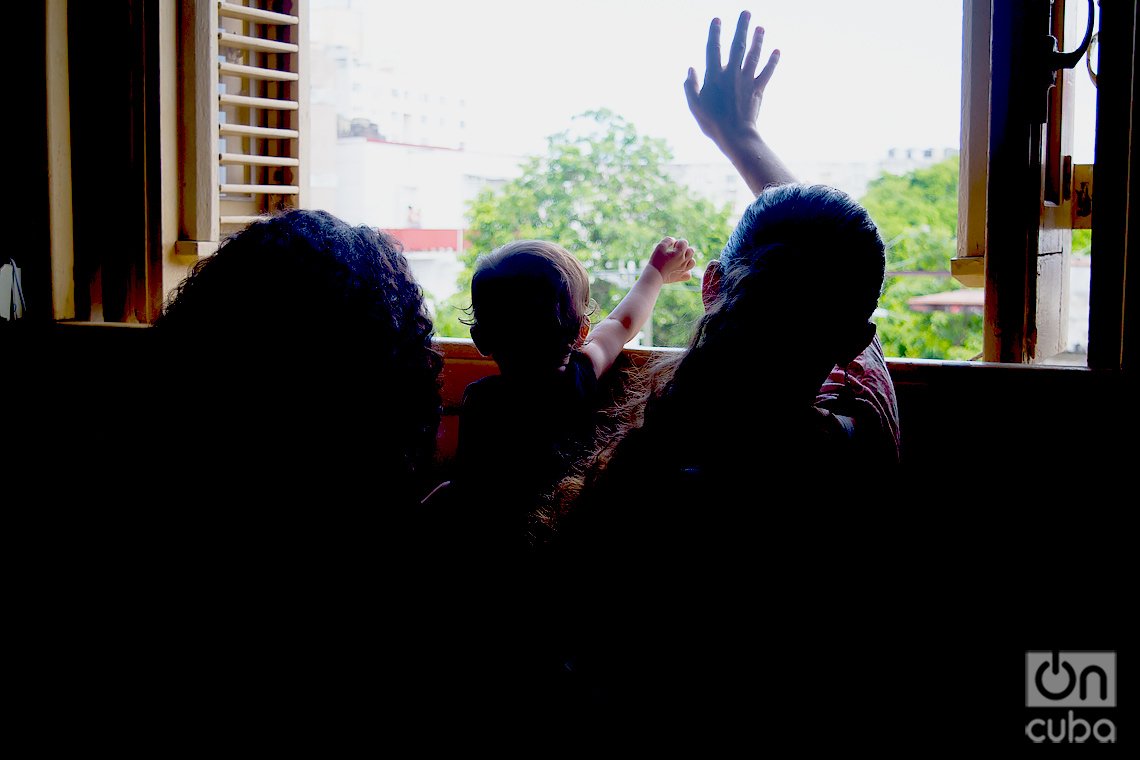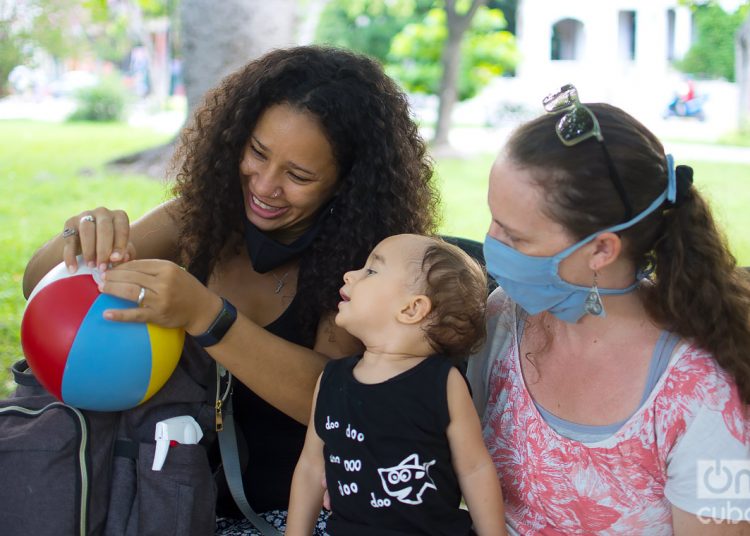The boy with two moms: that’s how Paulo has been known since the news spread. Although many people in Cuba know what it is to have more than one mother, although perhaps we have called “mommy” and felt the affections of more than one maternal figure, the difference is that both of Paulo’s mothers appear on his birth certificate. This marks the first time for Cuba; a wait of months for two women, and a change in computer software to allow the certification to say “mother” and “mother”.
Obstacles stood up like the little hands of this child who wants to show how big he loves his mothers. Dachelys Valdés Moreno and Hope Bastian got married in 2017, in Tallahassee, Florida. In that same place, their son Paulo was born in May 2019, thanks to an in vitro fertilization process that they were able to access because Hope is a US citizen. Neither marrying nor accessing assisted fertility processes is possible in Cuba for a couple of women.
But they live there, in the middle of Vedado, in a house that smells like pineapple, mango and guava (when Hope cooks, it can smell spicy; and when Dachelys does it, a little sweet). Once again, life beats the rules. To that life, that of a family of three who loves to sit together every day at the table, who loves listening to Pablo, Silvio, Van Van, rock and roll from the 50’s and children’s songs on a record player; to that family that loves to go to the park so that their son can play… we take a sneak peek.
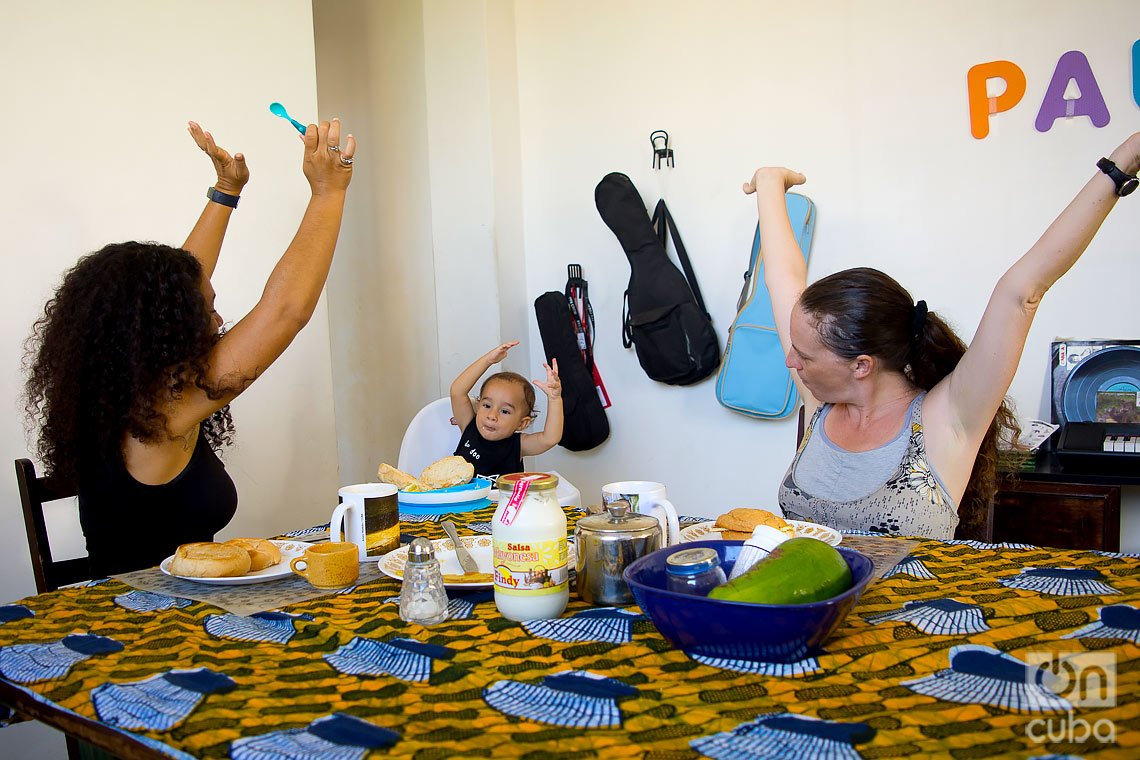
Dachelys and Hope met in 2015, on a trip to Cienfuegos for a meeting on non-heteronormative sexualities. From that time, they keep friends, photos, and a connection that lasts until today. Dachelys tells us when it started for her. “Hope was talking about her research. At a certain point, she said ‘we, Cubans (sorry, I know I’m not Cuban, but I feel like I am)’. Seeing someone from outside of the Island who spoke with that passion, who identified in such a way as to say that she felt like she was from here, was very striking for me. Besides that, I really liked her research and we sat down to talk about it later”.
Hope has lived in Havana since she was 18 years old. When she was studying Anthropology, she studied a semester at the University of Havana; and after graduating she returned to the city. They both lived in El Vedado when they met in Cienfuegos. Dachelys says that she has heard Hope repeat her side of the story, and Dachelys ventures to recount it. For her, the connection began when Dachelys, a recently graduated psychologist at the time, told her about her efforts to generate interest for Psychology in a difficult group of her students at a Faculty of Medical Sciences. “I am very passionate when I talk about education. And later on, she confessed to me that that had been important for her, that she liked how I was committed to it”.
A date to share the photos of the event, a meeting at the theater, a movie at home … That’s how it started.

Very early in their relationship, they decided they wanted to have a baby. “We were at a time in our professional and economic life that allowed us to do it, without too much concern. Hope was finishing her PhD and I was doing my Masters. We were discovering the values that we felt it was important to have together to raise and educate a person. Meeting someone with whom you can share those visions… I feel that is a wonderful gift. We made the decision to be mothers very easy; the complexity came later, in the ‘how’”, Dachelys confesses.
The “how” was dissipating in Cuba, where assisted reproduction is limited to heterosexual couples. They traveled abroad to have Paulo, a huge step in their life plans, but not the last to return to Havana, that city that they both chose to love. To return with equal rights … and equal peace of mind. “What would happen if one of the two, the one who did not give birth, who was not going to be the biological mother legally recognized in Cuba, left the country? What would happen if the biological mother died, or if we separated and the biological exercised her rights to keep the other mother away from the boy or the girl? All these things generated anxiety and a feeling of vulnerability on us, and we said ‘well, we are going to try to do this by all the means that guarantee us legal protection for when Cuba makes that leap to advance that path (because it is going to happen, we are sure it will)’”.
They went far enough to manage to get a paper recognizing them both as mothers. Although the important question does not fit in that role.
What is motherhood?
Dachelys: “A spectacular thing, a learning process in both ways: us learning from Paulo, Paulo from us, us from ourselves, even us from other families, of the same configuration as ours and also from the rest of the families around us.
It has also been another construction. I believe that sometimes when there are female couples or male couples, everyone expects someone to fulfill a specific role that we have seen in many heterosexual couples who follow a traditional pattern. Sometimes people expect that perhaps one of us will assume some roles and the other one will assume the other roles. There’s always that comparison, that analogy. A lot of visions go in that path. For us, nursing Paulo and nursing him together has been an impressive discovery. Motherhood is challenging you all the time, shaking what you thought you knew about yourself and bringing up some things you didn’t even know”.
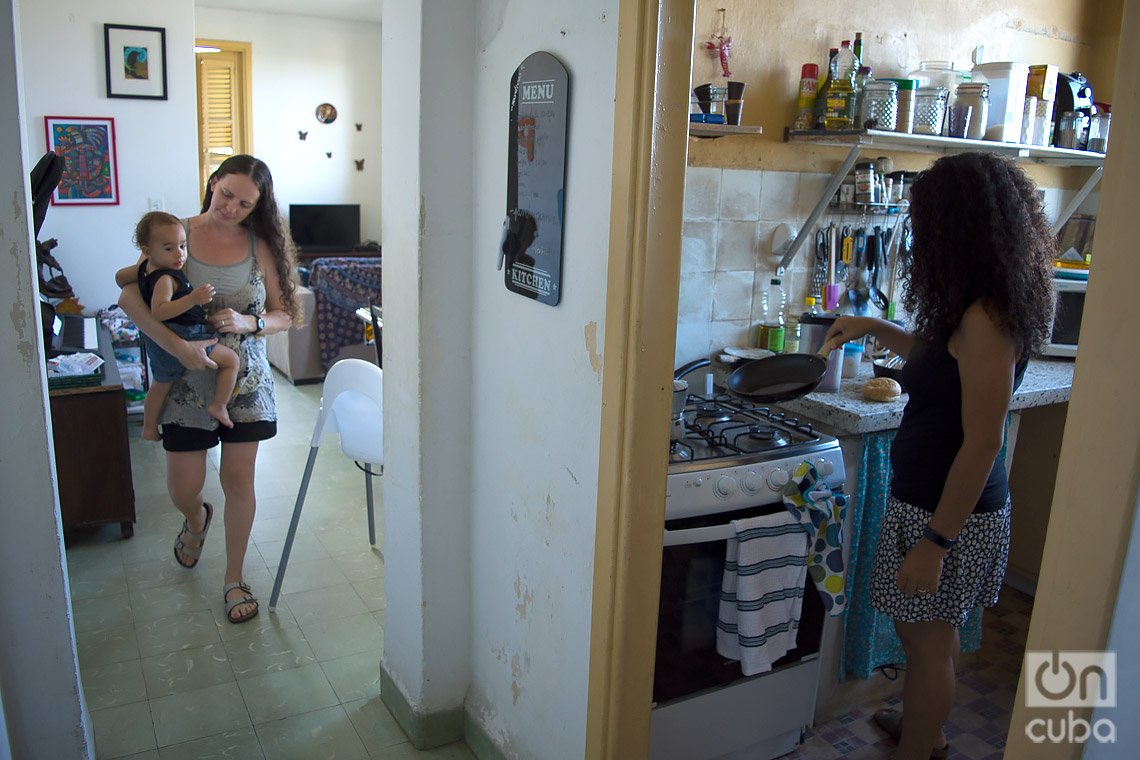
Dachelys adds that motherhood requires skills “and a lot of support, not only between us but also from the ones around us, from all of our love networks: friends, family, and neighbors. Let’s go back to the basic principle of everything: motherhood is saying ‘I want to be a mother’, nobody is imposing it on me, nobody is telling me how to do it; I am completely convinced (and when I say ‘I’, I speak for both of us) that I want to have a son or a daughter, and raise him or her. From that selfish act that is the ‘I want’, we would give this little person all the possibilities so that they can develop themselves and be happy. And watch them grow, and let them be”.
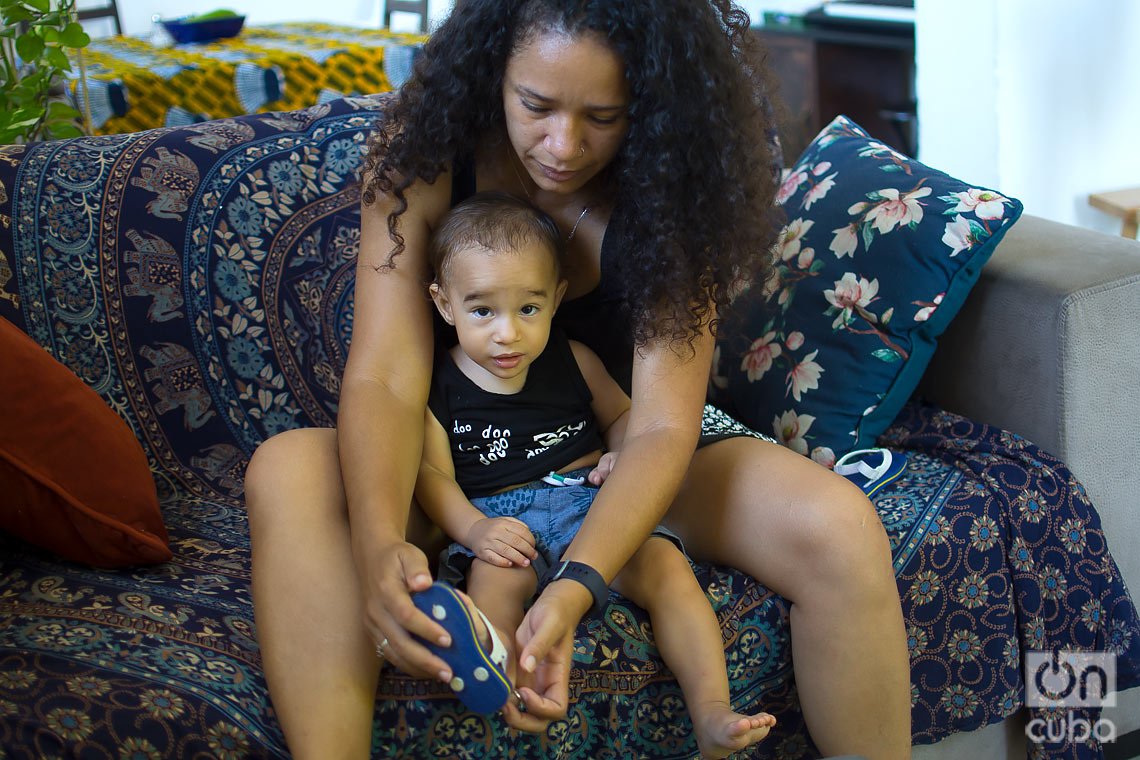
She sums up the feeling that makes her voice crack: “It’s impressive, you hear it and see it and feel it because I have felt it with my nephews and nieces and with the children of other friends. When it is your child, which you decide to be your child, motherhood is magnificent”.
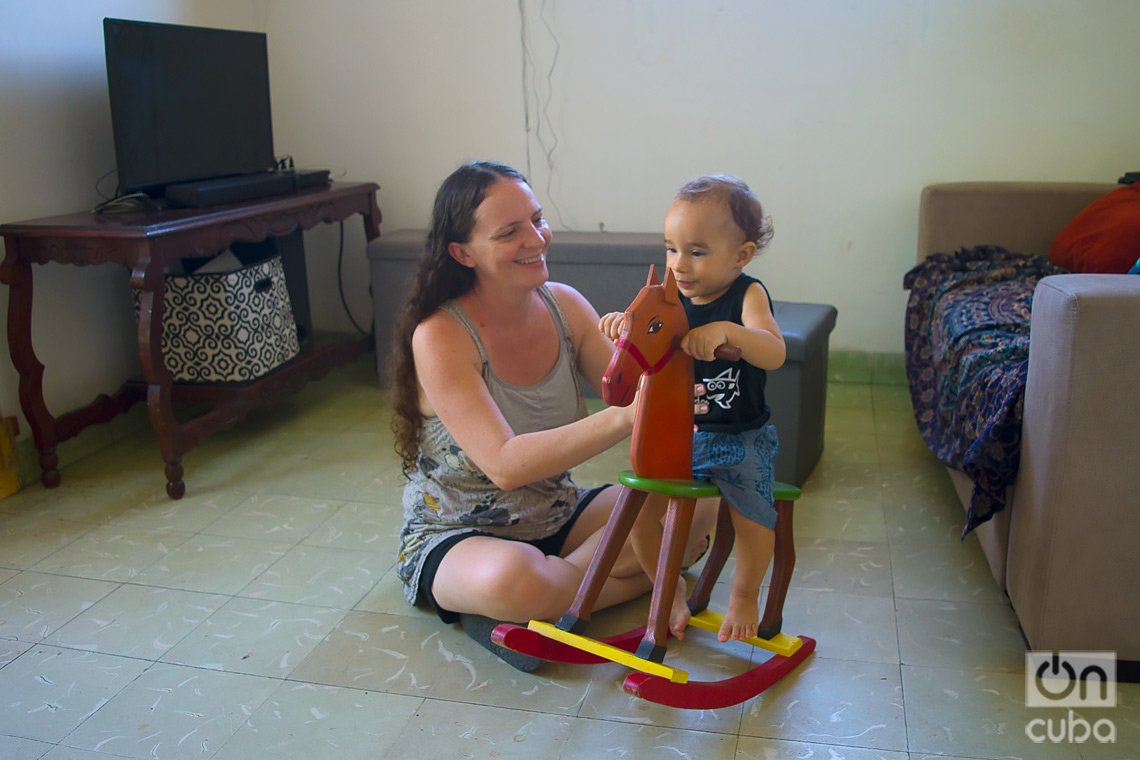
On a typical day, Paulo gets up between 7:30 and 8:30 in the morning (if he gets up at 9 it’s wonderful news for them). One of the two, the one who is more rested, gets up, and plays with him for a while. When the other one gets up, they make breakfast and the three of them sit at the table for breakfast. (Sometimes breakfast is quiet, other times Paulo wants to get out of his chair, and they end up walking around the house with him to feed him breakfast).
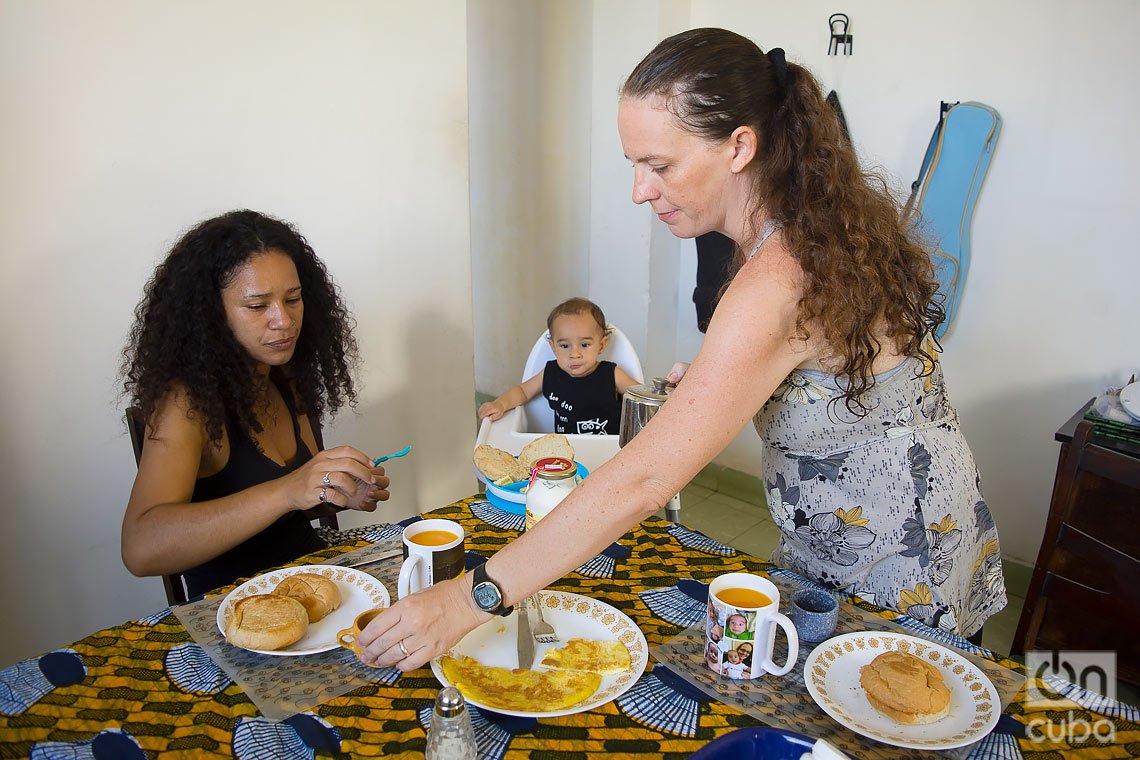
After breakfast, they play a lot with him, with blocks, or balls… They listen to music on the record player. He sleeps in the middle of the morning and, when they see that he is not going to do it, they go to the park for a while. They come back to have lunch … Usually, what happens is that he sleeps, and they use that time to work, to watch a TV show (Dachelys laughs: there is never time to watch an entire chapter) and to talk about work, how their life is going. In the afternoon, one of them gives him a bath; they eat, they read, they might listen to music again, or Dachelys’s father comes to visit. Between 9:30 and 10 pm, Paulo starts to show sleep signs. One of the two helps him sleep. Then they work again, try to finish the TV show they started earlier, or they just go to sleep.
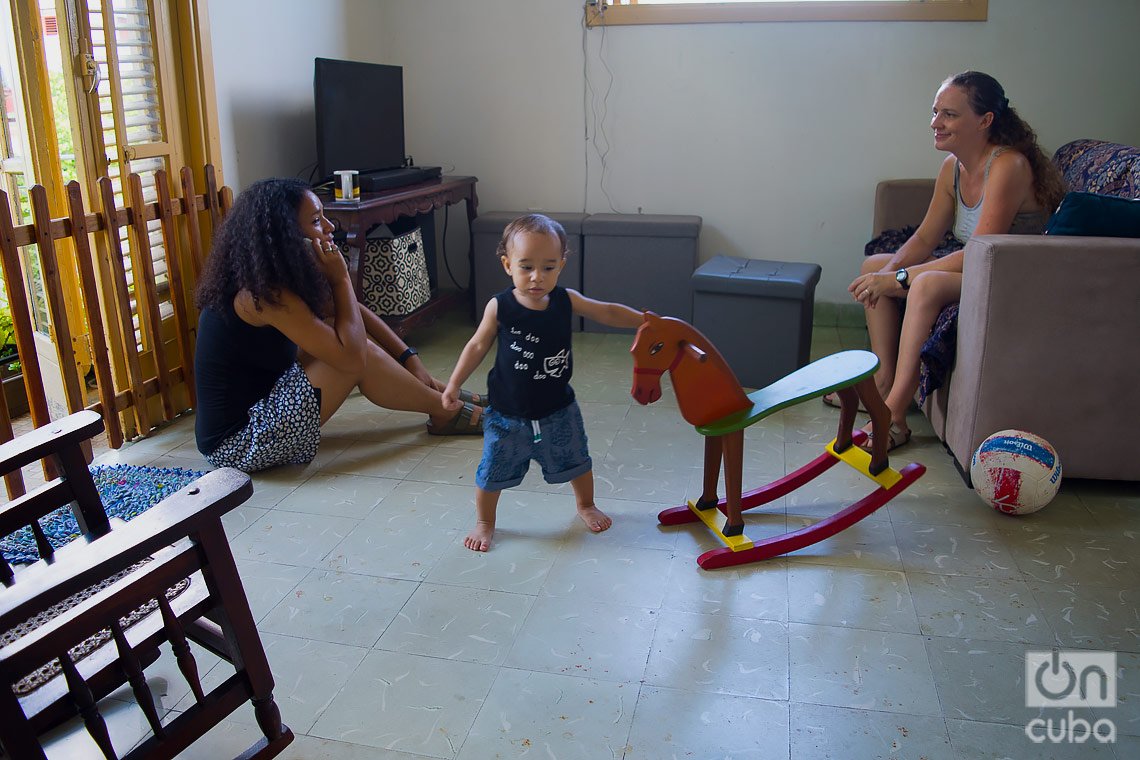
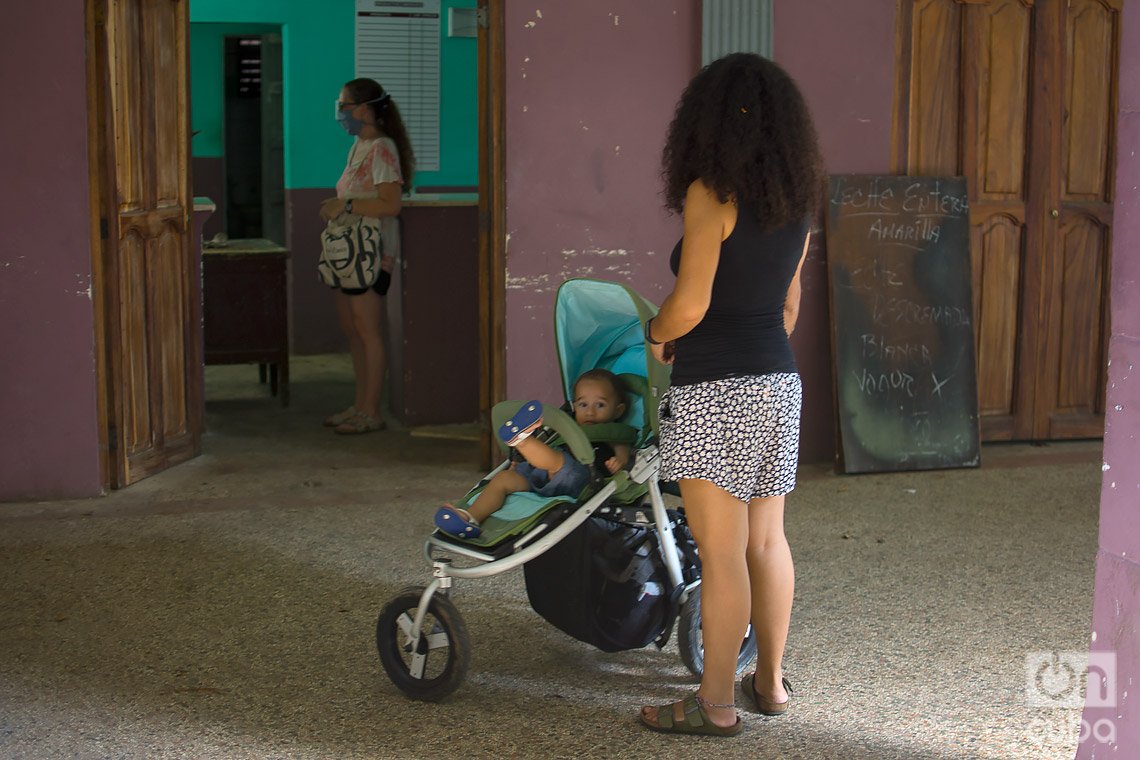
Their favorite activities have changed with the arrival of Paulo. Sitting at the table to eat together, especially now that Pablo can do it by himself, is on top of their list. “At the beginning we took turns, recalls Dachelys. One ate first, while the other one fed Paulo, even though the three of us sat at the table together as well”.
Those visits to the park also capture their best moments. “Especially in these times of restrictions, quarantine and pandemic… Paulo spent a long time without leaving the house, only for pediatric consultations and vaccinations. When Havana started phase 1, going to the park for an hour every day was, and continues to be, one of our favorite activities (although now we are going to have to limit it)”.
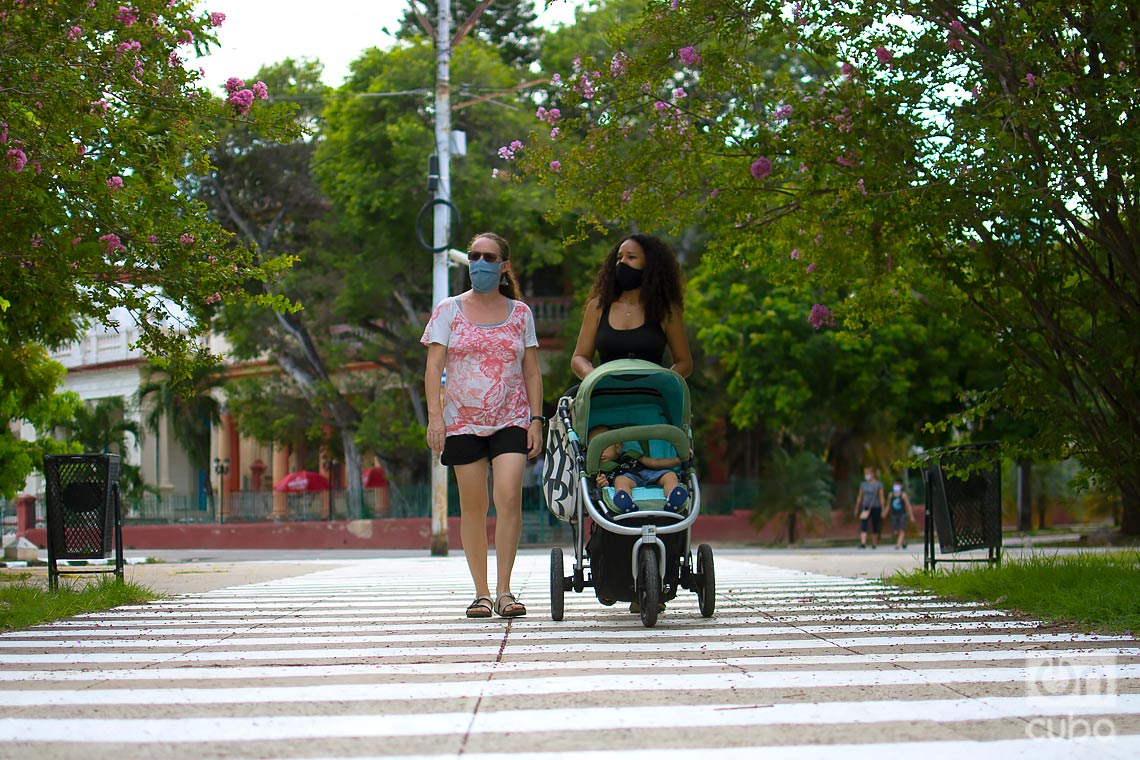
Dachelys evokes the first time that Paulo could go to the park: such a large space, so much to see. “Seeing him interact with nature, with other children, with more people … My dad accompanies us almost always, and for us seeing them play together is one of the things we enjoy the most”.
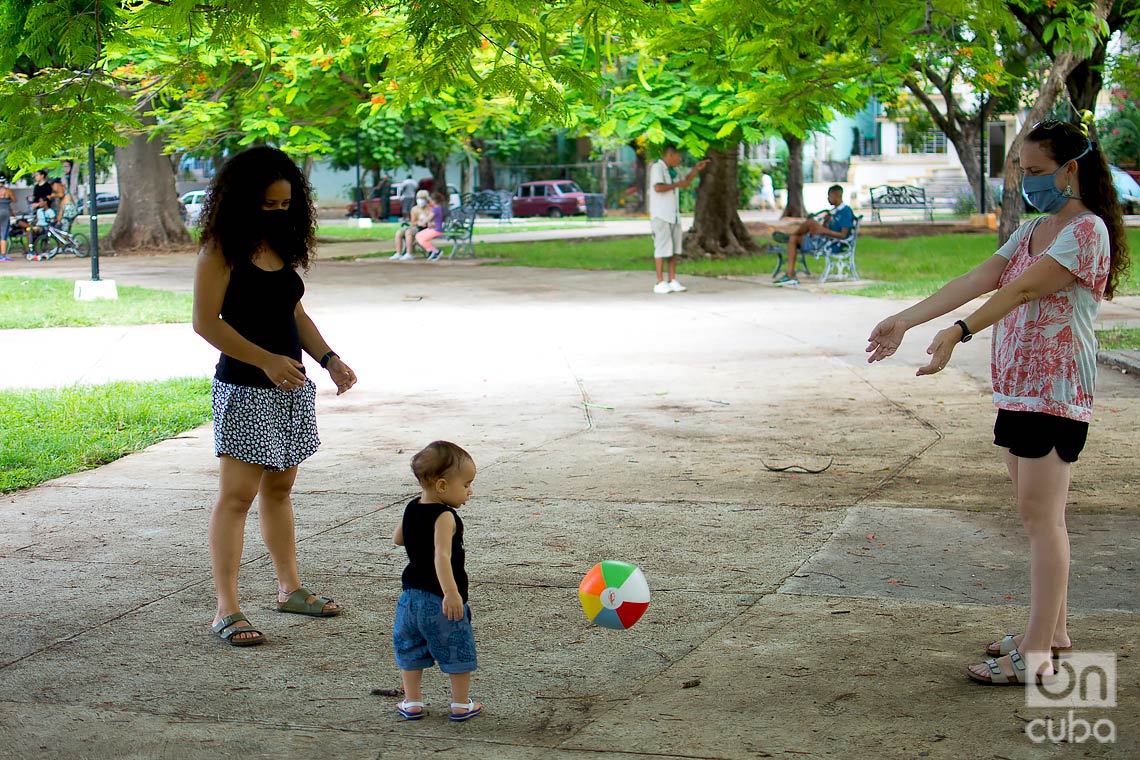
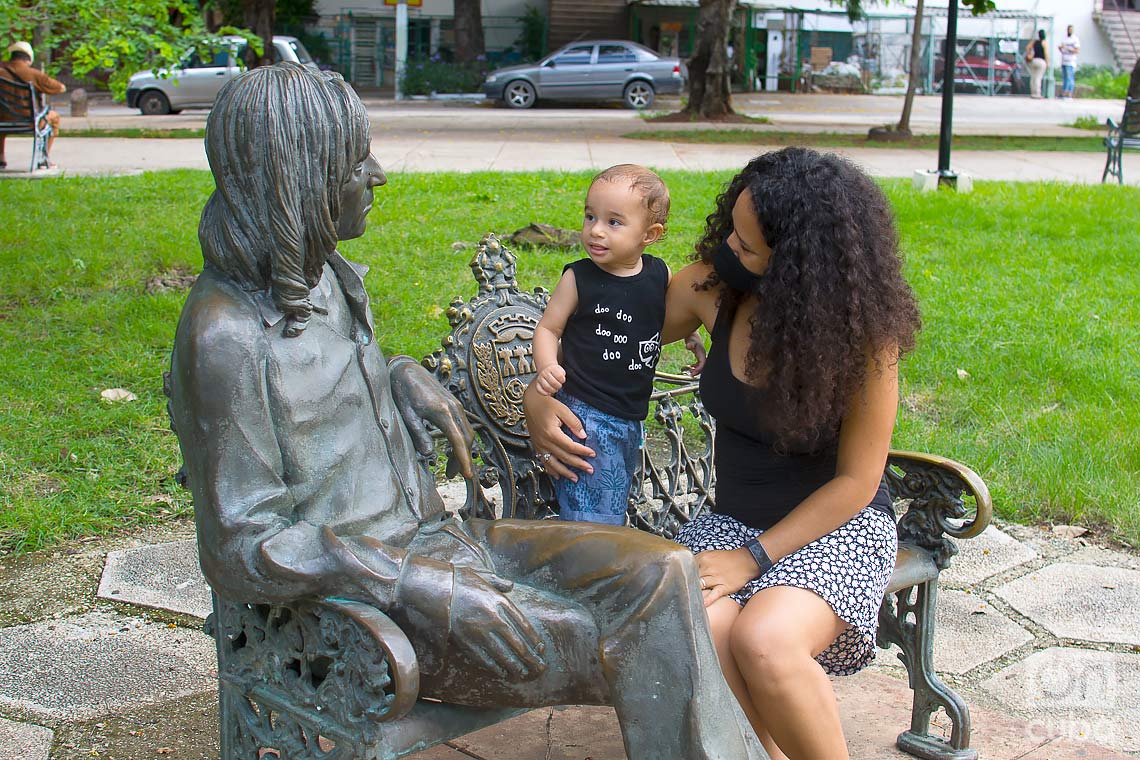
Another activity they love is reading children’s books to Paulo in English and Spanish. “We have children’s storybooks with two moms. There is one that rhymes and Paulo responds a lot to that rhythm and musicality. They are very simple stories; they only narrate the routine of a boy or girl with their moms. They are fun, with very simple images. We have another book about animals. The two books that he likes the most are Mom, Mommy, and I and The Hat Seller ”.
When he was little they sang to him and played the ukulele, and now they sometimes let him play on the piano. Music is opening its way in Paulo’s childhood. His mothers say that he enjoys nursery rhymes and also music from Van Van. “Listening to music on the record player does magic on him, impressive. Sitting down and playing a record only lasts seconds because Paulo immediately wants to stand up and watch how the record spins. Now he’s trying something that I think is dancing. Watching him try to dance has become one of our favorite activities” says Dachelys.
Paulo also enjoys eating. “He eats little, but a little bit of everything… everything seems delicious to him. It is a caress to our ego as cooks the fact that he eats everything with such pleasure. We try to balance his food, and we give him lots of fruits. We have not introduced sugar to his diet, the amount of salt we use is minimal, and we try to give him the healthiest things”.
Dachelys defines herself as more pastry and traditional in the kitchen, compared to Hope, who is more innovative. The food shortage in times of coronavirus has made them “innovate”, as it has done to so many Cuban families; to them, and to all those who share the fate of an Island, with common scraps and such diverse threads.
For those diverse families I ask… and Hope asks me back. “How not to be a diverse family in Cuba? There are so many types of families in this country. A diverse family is a grandmother raising a grandchild, it is a father raising his daughter or son… They are so many, and they are all different”.
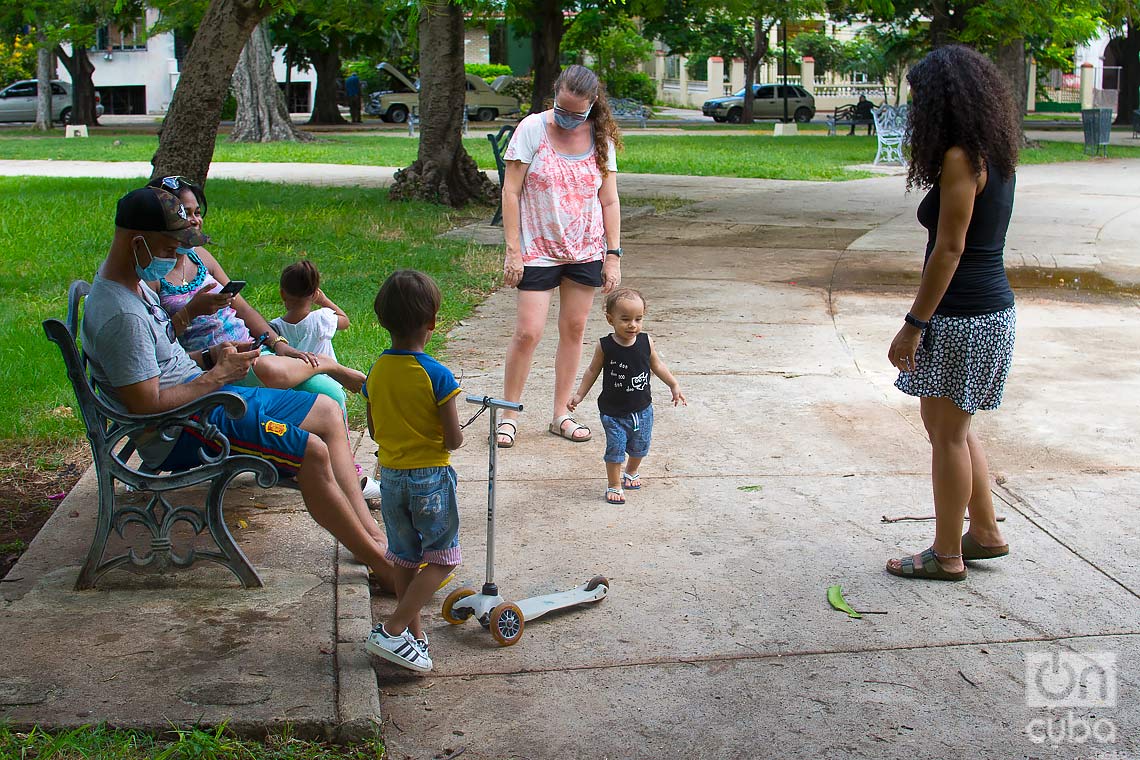
Dachelys emphasizes that biology is only one of the factors that can mediate the family relationship; that not all reproduction becomes a family, and that not every family depends on reproduction. “The origin should be love, love is the only thing that makes the difference. We have built our idea of family, the group we are proud to form. Like when you create a painting, we have been adding everything that we feel that unites us. That is what we want to share with Paulo. That is family for us: the trip that we have decided to take together, even before Paulo was part of our lives. The path of accompanying each other, loving each other, being together. We said ‘it is going to expand with the arrival of Paulo’ and it may continue to expand: with another baby, or with a pet. And even if it does not grow in number, it will enrich itself spiritually, because Paulo will teach us even more”.
Paulo wakes up. Dachelys lowers her voice.
“Happiness… defining it is complex, it is a very philosophical concept. That feeling of knowing that we are doing things right and that we are loving and accompanying each other in the process that is life, that is to grow. The path we are traveling, with its ups and downs (luckily, more ups than downs). We have made that state of happiness to depend on us, to depend a lot on us … and we continue to build it. Right now, realizing how much we love each other and how proud we are of what we’ve built, looks a lot like happiness, and, at times, it is”.
